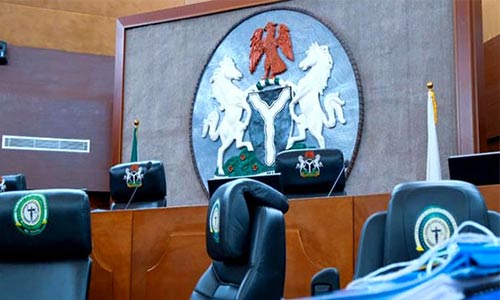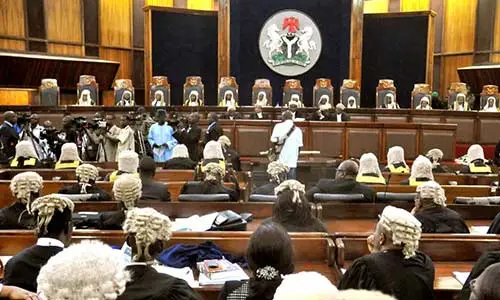SUPREME COURT JUDGEMENTS 17/10/2023
Requirements For Proof Of Land Ownership By Traditional History

In the Supreme Court of Nigeria
Holden at Abuja
On Friday, the 7th day of July, 2023
Before Their Lordships
John Inyang Okoro
Uwani Musa Abba Aji
Ibrahim Mohammed Musa Saulawa
Adamu Jauro
Emmanuel Akomaye Agim
Justices, Supreme Court
SC/665/2018
Between
CHIEF NELSON AMADI MAXWELL EGBULEFU
CLEMENT OTAMIRI
MR ISREAL A. AMOKWURU APPELLANTS
MR EMMANUEL E. EMU
MR FRANCIS AMADI
(for themselves and as representing the Umuogo
Family of Umuechem in the Etche Local
Government Area of Rivers State)
And
CHIEF RICHARD ORLU
CHIEF VICTOR AMAEWHULE
EMMANUEL EKWE RESPONDENTS
NYESO ORDU
GILBERT EZIHUO
IHENACHO EZIHUO
(for themselves & as representing the Omuegwu family of
Igwuruta-Ali, Igwuruta in the Ikwerre Local Government Area
of Rivers State)
(Lead Judgement delivered by Honourable Adamu Jauro, JSC)
Facts
The Respondents (as Claimants) and the Appellants (as Defendants), were involved in a dispute over a piece of land. Parties made an attempt at customary arbitration, which did not produce a conclusive result; hence, the Respondents instituted an action in Suit No. IHC/105/2002. The Appellants instituted a Cross-action in Suit No. IHC/26/2003. Both actions were consolidated, with the Respondent as the Claimant and the Appellants as the Defendants.
At the trial court, the Respondents claimed that their ancestor, Egwu, along with his descendants, had a historical connection to the land. They asserted that their ancestor, Egwu, and his children had continuously possessed and used the land, and after the death of Egwu, the land devolved on his descendants as family property. The Respondents asserted further that they leased the property to the Appellants and the Niger Delta Rubber Company and its successor-in-title, the Delta Rubber Company Limited since 1962 and were being paid annual rents by the company and the Appellants. The Respondents are also part of an association of landlords (Rubber Estate Landlords Association) to the Delta Rubber Company Limited.
On the other hand, the Appellants asserted that their ancestor, Echem, had founded the land, and they were the rightful owners, although they did not state how the land was founded/acquired, neither did they lead evidence surrounding the founding of the land. The Appellants also denied being customary tenants of the Respondents, and having paid tribute to the Respondents. The Appellants also stated that they had been landlords to the Shell Petroleum Development Company (SPDC), since 1971.
The trial court ruled in favour of the Appellants, finding that the Respondents failed to prove that the Appellants were their customary tenants and that their traditional history was unreliable. The Respondents’ appeal to the Court of Appeal was successful. The court found that though there were loopholes in the traditional history that the Respondents relied on as proof of their title to the land, the court relied on long-term acts of ownership exercised by the Respondents to hold in their favour. The Court of Appeal also held that the failure of the Appellants to lead evidence as to how their founder, Echem, founded the land, was fatal to their traditional history and essentially, the Appellants’ case.
Dissatisfied with the judgement of the lower court, the Appellants appealed to the Supreme Court.
Issue for Determination
The sole issue adopted by the Apex Court in its determination of the appeal is:
Whether having regard to the pleaded facts and evidence led at the trial, the Honourable Justices of the Court of Appeal were not right in reversing the judgement of the trial court.
Arguments
On the sole issue, Counsel for the Appellants set out the settled five ways of proving title to land, and cited the case of IDUNDUN v OKUMAGBA (1976) 9 & 10 S.C 27 in support. Counsel submitted that both parties relied on traditional history in this case, and that a party relying on traditional history as his root of title must provide detailed information about who founded the land, how it was founded, and the intervening owners. Counsel contended that the current position of the law allows for the naming of a progenitor as the founder, presupposing that the land was originally owned by settlement, thereby making it unnecessary to provide extensive details about how it was founded. He relied on the case of SALISU v MOBOLAJI (2016) 15 NWLR. (PT. 1535) 242. Counsel asserted that the Appellants’ ancestor, Echem, was the first to settle on the land in question and engaged in farming activities. He faulted the lower court for relying on recent acts of ownership and possession, when the Appellants had already proven their ownership through traditional history. Counsel also challenged the lower court’s use of the Respondents’ membership of the Rubber Estate Landlords Association as proof of land ownership, and argued that membership of this Association is not a legally recognised method of proving land ownership, and violates the constitutional right of association which includes the right not to associate. Counsel contended that the evidence presented, including Exhibits O – O19, demonstrated that the Appellants had a stronger claim to recent acts of ownership, such as their 1964 lawsuit against the Eastern Nigeria Development Corporation and their right to receive payments. Furthermore, Counsel argued that the lower court misunderstood the significance of Exhibit M, which they claimed was a Peace Panel Report, not an Arbitration Panel Report. They contended that the report was subject to an oath, and could not be considered a Customary Arbitration Report.
In response to the Appellants’ submissions, Counsel for the Respondents argued that both parties relied on traditional history as their root of title. However, the Respondents went ahead to plead their numerous acts of long and recent possession, with exhibits to substantiate same. He submitted that the Appellants’ pleadings in support of their claim of ownership to the disputed land by traditional history was faulted, as they omitted to plead how the land was founded.
In response to the contention of the Appellants’ Counsel that once a named progenitor is said to have founded a land, it presupposes that the land was originally owned by settlement, counsel for the Respondents submitted that neither the case of SALISU v MOBOLAJI (2016) 15 NWLR (PT. 1535) 242 nor – TITILOYE v OLUPO (1991) 7 NWLR (PT. 205) 519, relied on by the Appellants, did the Apex Court deviate from the established requirements of burden of proof on a party claiming title by traditional history. Counsel submitted further that if the Appellants were aware of the facts surrounding the founding of the disputed land, they would have clearly pleaded same. He argued that having failed to plead how their ancestor founded the land in dispute, the Appellants are not entitled to lay claim to same by virtue of traditional history. The cases of ADDAH v UBANDAWAKI (2015) EJSC 125; AKINLOYE v EYIYOLA (1968) NWLR 72, were cited in support. The Respondents contended that the lower court rightfully concluded that the traditional evidence presented by both parties, was inconclusive. Hence, it relied on acts of ownership that extended over a significant period, benefiting the Respondents. Counsel argued further that Delta Rubber Company Limited occupied part of the disputed land, and that the Respondents were among the landowners who granted the company access, while the Appellants did not belong to the Landowners’ Association. Regarding Exhibits O – O19, Counsel submitted that these exhibits did not reflect the Appellants suing Delta Rubber Company Limited, but instead, related to the Appellants’ Umuechem larger family suing Shell Petroleum Development Company. Counsel for the Respondents defended Exhibit M as a Customary Arbitral Panel decision, disputing the Appellants’ argument that it needed to be submitted to a court for legal effect. They argued that the panel was set up with the court’s permission, and that arbitral awards are generally considered final judgements.
Court’s Judgement and Rationale
Deciding the sole issue, the Supreme Court held that where a party relies on traditional history, he is duty bound to prove by evidence the founder of the land, how the land was founded, and the names of the persons who owned the land from the founder to the current title holder – ADDAH v UBANDAWAKI (2015) ALL FWLR (PT 775) 200. The court noted that a party claiming declaration of title to land through traditional history must plead and lead cogent and reliable evidence as to how the land was founded by the named founder, otherwise his claim will fail. By its nature, evidence of traditional history is hearsay which would ordinarily be inadmissible, but it is elevated to the status of admissible evidence by virtue of Section 44 of the Evidence Act, 2011. Thus, it must be established through uncontradicted, believable evidence. Hence, the omission to do so was fatal to the Appellants’ claim of title to the land, and the lower court was right in holding that the evidence of traditional history relied on by both parties were inconclusive.
On Exhibit M, the Apex Court held that being a decision of a non-judicial body, it is not automatic that a decision relied on as the outcome of a customary arbitration, will create an estoppel to bar further proceedings. To establish such an effect, the following conditions must be met: (i) voluntary submission of the parties in dispute to an arbitration; (ii) express or implied agreement on the decision’s finality; (iii) conformity with customs, trade or business; (iv) the arbitrators must reach a decision and publish their award; and (v) acceptance of the decision at the time it was made. In this case, the evidence produced did not support the fulfilment of the condition that the parties agreed expressly or by implication that the decision of the arbitrators would be accepted as final and binding, or that the decision was accepted at the time it was made. Thus, Their Lordships held that Exhibit M did not automatically create an estoppel or binding effect, and same cannot be regarded as such.
The court also addressed the argument on the use of the Respondents’ membership of the Rubber Estate Landlords Association, as proof of land ownership. Their Lordships held that the Respondents’ membership in the Rubber Estate Landlords Association supported their ownership claim, as payments from Delta Rubber Company Limited were made to the Association, and the Appellants did not challenge these payments. In contrast, doubts were raised about the Appellants’ claim of leasing land to Delta Rubber Company Limited due to letters (Exhibits J and K) from the company, questioning the credibility of the Appellants landholding and informing the Appellants that the company did not recognise them as its landlord. More so, in law, only a landlord is entitled to rent, and no one else – ABIOYE v YAKUBU (1991) LPELR-43 (SC).
Furthermore, the Appellants’ reference to a 1964 suit against SPDC lacked clarity, and did not strongly support their case.
In conclusion, the Apex Court upheld the decision of the lower court favouring the Respondents’ ownership claim, noting that Civil matters are decided on balance of probabilities – INTERDRILL (NIG.) LTD. v U.B.A. PLC (2017) 13 NWLR (PT. 1581) 52. The appeal was dismissed, as lacking in merit. The judgement of the Court of Appeal, Port Harcourt, which set aside the judgement of the High Court, Rivers State, was thereby affirmed.
Appeal Dismissed.
Representation
D.O. Ezaga, SAN with P.I.O. David Ezaga, Esq. for the Appellants.
C.C. Achunulo, Esq. for the Respondents.



